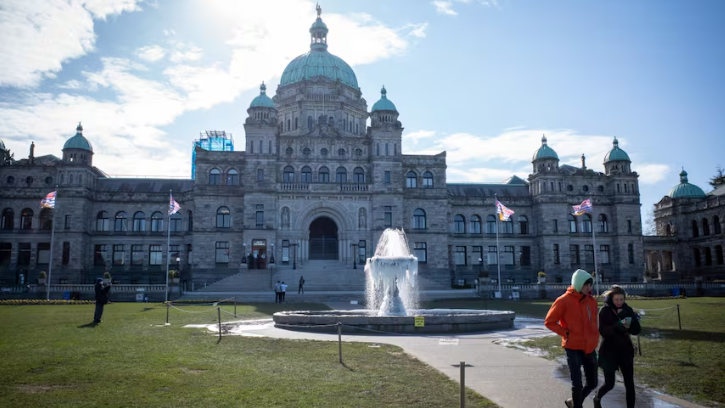BC legislature opens amid $12B deficit, strike and political turmoil
(Image courtesy CBC)
British Columbia’s fall legislative session opened Monday under a widening deficit, a continuing public-sector strike and mounting questions about the government’s management of growth and affordability.
Government House Leader Mike Farnworth said the NDP’s agenda focuses on jobs, affordability and major projects. “BC and Canada are facing serious challenges in the face of US President Donald Trump’s attacks on our economy and sovereignty, and our legislation this fall reflects the urgency of that work,” he said in a government release. “Our legislative agenda is squarely focused on standing up for people in British Columbia at this critical time.” He added that government will maintain “strong universal public healthcare, child care and homes people can afford that are the foundation of a strong economy.”
The province plans to introduce about 18 bills over the six-week session, most in the first week. Expected measures include three carried over from spring — changes to ICBC road-testing rules, a bill to recover healthcare costs in at-fault injury or sickness cases, and an omnibus bill amending various statutes — and a bill advancing BC Hydro’s 450-kilometre North Coast Transmission Line between Prince George and Terrace.
Union demands
The session begins under heavy fiscal pressure. The government is working to contain a projected $12-billion deficit while facing union demands for higher wages. The BC General Employees’ Union strike is in its fifth week, with workers and supporters rallying outside the legislature Monday, urging the province back to talks after negotiations broke off on September 29. The government’s offer of five percent over two years, which unions say is insufficient, remains unchanged. Farnworth said operations will continue even if picket lines form, noting there are legal limits on where pickets can be placed.
Public-sector workforce expansion
Recent analysis by Coastal Front found the province’s public-sector workforce has expanded by 50 percent since 2016, from 383,527 to 593,547 employees, with average compensation up 29 percent. Community social services alone grew more than 300 percent in headcount over the same period. Finance Minister Brenda Bailey has pledged $1.5 billion in savings over three years, but additional measures may be required to address what the ministry now pegs as an $11.6-billion deficit.
Information received from the BC Public Sector Employers' Council Secretariat.
Housing
While the government continues to cite housing and affordability as priorities, new data show persistent gaps. A provincewide homelessness count released Monday found increases in 12 of 20 surveyed communities since 2023, despite a $19-billion provincial housing program launched in 2017. Housing Minister Christine Boyle said the results highlight “the need to help the most vulnerable members of our communities” and pointed to 93,600 homes delivered or underway since 2017.
At the same time, only three of 10 municipalities in the province’s highest-need housing group met their first-year build targets, even as the government announced an additional $9 million for local development-approvals work.
Inside the legislature, four political parties and two Independents now hold seats. The NDP has 47, the BC Conservatives 40, while the Greens and One BC hold two each. The Greens are led by Emily Lowan, who does not have a seat, and One BC enters its first session as an official party after two former Conservative MLAs formed the group earlier this year.
The BC Conservatives, meanwhile, opened the session amid renewed internal turmoil. Party Leader John Rustad confirmed that caucus leadership searched MLAs’ phones after a leak of internal discussions about his leadership was reported in the media. Rustad told reporters the move was supported by caucus members seeking to identify the source of the leak, though no culprit was found. The incident follows a series of controversies, including staff dismissals, MLA defections and a leadership review in which Rustad secured just over 70 percent support from fewer than one-fifth of party members.
The fall session places fiscal restraint, labour tension and political instability at the centre of debate as the government moves to advance its legislative program.



